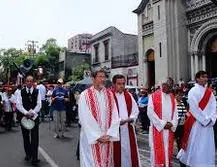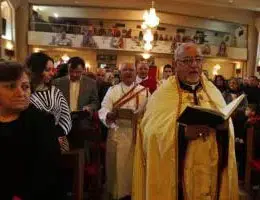 Coming from the Latin word congregationatio , the assembly or meeting that is organized with the objective of dealing with certain matters is called a congregation . Beyond this meaning, which is the first mentioned in the dictionary of the Royal Spanish Academy ( RAE ), the concept usually refers to a community of religious or a brotherhood of faithful .
Coming from the Latin word congregationatio , the assembly or meeting that is organized with the objective of dealing with certain matters is called a congregation . Beyond this meaning, which is the first mentioned in the dictionary of the Royal Spanish Academy ( RAE ), the concept usually refers to a community of religious or a brotherhood of faithful .
Within the framework of the Catholic religion , a congregation is usually a body of priests who exercise ecclesiastical ministries. Specifically, the group formed by the members of an institute of consecrated life is called a Catholic religious congregation , who take vows of poverty, obedience and chastity and lead a fraternal life in common according to certain constitutions.
Lay congregations are composed of individuals who are not priests and who pronounce simple vows. The Marist Family (created by Marcellin Champagnat ) and the Brothers of the Sacred Heart (a group founded by André Coindre ) are examples of lay congregations.
Clerical congregations , for their part, have members who also take simple vows, although they are on a path towards the priesthood. The Salesian Family (which is inspired by Saint Francis de Sales ) and the Congregation of the Augustinians of the Assumption (founded by Emmanuel d'Alzon ) are among these congregations.
It should be noted that the Holy See has boards known as congregations, whose mission is to take care of different matters. The Congregation for the Doctrine of the Faith , in this framework, is a body that is responsible for preserving the doctrine of the Catholic Church . It was founded in 1542 and renamed on different occasions.
For Protestant churches, this concept refers to the grouping of faithful that arises from an agreement or agreement established between them, and not precisely from a creed. Churches belonging to the congregationalist policy understand the congregation as an autonomous church, which freely chooses to join other similar ones to create an association of congregations or Christian denomination so that they can help each other.
 It is worth mentioning that congregationalism is a movement that dates back to the late 16th century in England that had the objective of emphasizing the right and duty that each congregation had to practice its own government , without depending on any other authority . It can be defined as an extension of Puritanism , a radical faction that began with the English Reformation and was contemporary with the mandate of Elizabeth I, based on the absolute supremacy of God over the organization of human civilizations, as an authority that should reform us to lead us to a life immersed in obedience and humility.
It is worth mentioning that congregationalism is a movement that dates back to the late 16th century in England that had the objective of emphasizing the right and duty that each congregation had to practice its own government , without depending on any other authority . It can be defined as an extension of Puritanism , a radical faction that began with the English Reformation and was contemporary with the mandate of Elizabeth I, based on the absolute supremacy of God over the organization of human civilizations, as an authority that should reform us to lead us to a life immersed in obedience and humility.
Generally, followers of Congregationalism departed from creeds and placed special emphasis on preaching rather than sacraments, with the exception of the Eucharist and baptism. It is possible to clearly distinguish the English Congregationalists, who we could identify with the precursors of this movement , from the Americans, the majority of whom are associated with the United Church of Christ , one of whose members is former President Barack Obama himself.
Some of the most common and well-known examples of congregational politics can be found in Unitarian Universalism , the Disciples of Christ (a denomination founded in the 19th century by Thomas and Alexander Campbell), and Baptist churches .
With respect to Jehovah's Witnesses , the meaning they give to the term congregation is the fundamental and primary unit of the faithful, who are grouped together in a well-defined territory and can have a number of participants ranging from thirty to one hundred and seventy. . On the other hand, all believers in the world can also be referred to using this word.
